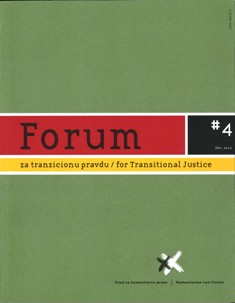

Sorry, this entry is only available in srpski.
 OVER the weekend Kosovo Albanians have been celebrating the fifth anniversary of Kosovo’s declaration of independence. At the same time Hashim Thaci, Kosovo’s prime minister and Ivica Dacic, his Serbian counterpart, are preparing for another round of European Union (EU) sponsored talks in Brussels. According to Cathy Ashton, the EU’s foreign policy high representative, the two-day session that will begin on February 19th will be the “most important part” yet.
OVER the weekend Kosovo Albanians have been celebrating the fifth anniversary of Kosovo’s declaration of independence. At the same time Hashim Thaci, Kosovo’s prime minister and Ivica Dacic, his Serbian counterpart, are preparing for another round of European Union (EU) sponsored talks in Brussels. According to Cathy Ashton, the EU’s foreign policy high representative, the two-day session that will begin on February 19th will be the “most important part” yet.
 This special issue, whose aim is to contribute to the debate on transitional justice in the Western Balkans, is largely based on two events. One is a day-long seminar entitled ‘European Integration and Transitional Justice: Prospects and Policy Options for Restorative Justice in the Western Balkans’, organised by the former Centre for the Study of Global Governance, London School of Economics and Political Science, and the Humanitarian Law Centre, Belgrade, held at the European Commission in Brussels in December 2009.
This special issue, whose aim is to contribute to the debate on transitional justice in the Western Balkans, is largely based on two events. One is a day-long seminar entitled ‘European Integration and Transitional Justice: Prospects and Policy Options for Restorative Justice in the Western Balkans’, organised by the former Centre for the Study of Global Governance, London School of Economics and Political Science, and the Humanitarian Law Centre, Belgrade, held at the European Commission in Brussels in December 2009.
 The District Court in Prizren mixed trial panel presided by international Judge Mariola Pasnik[1], rendered a judgment on February 1st, 2013, acquitting the accused Ejup Kabashi and Sokol Bytyqi of charges for the commission of a war crime against civilian population from Article 142 in relation to Article 22 of the Criminal Code of Yugoslavia (the criminal offence which is also incriminated by the Criminal Code of the Republic of Kosovo in Article 152 in relation to Article 31).
The District Court in Prizren mixed trial panel presided by international Judge Mariola Pasnik[1], rendered a judgment on February 1st, 2013, acquitting the accused Ejup Kabashi and Sokol Bytyqi of charges for the commission of a war crime against civilian population from Article 142 in relation to Article 22 of the Criminal Code of Yugoslavia (the criminal offence which is also incriminated by the Criminal Code of the Republic of Kosovo in Article 152 in relation to Article 31).
 BIRN Director Gordana Igric took part in a Centre for Euro-Atlantic Studies conference entitled ‘Serbia, the Western Balkans and the EU: What Do We Have in Common in the Areas of Security and Defence and How to Make the Most of it for Stability and Progress in the Region’ on January 29 in Belgrade, on a panel dedicated to the challenges facing transitional justice in Serbia and the Balkans region.
BIRN Director Gordana Igric took part in a Centre for Euro-Atlantic Studies conference entitled ‘Serbia, the Western Balkans and the EU: What Do We Have in Common in the Areas of Security and Defence and How to Make the Most of it for Stability and Progress in the Region’ on January 29 in Belgrade, on a panel dedicated to the challenges facing transitional justice in Serbia and the Balkans region.